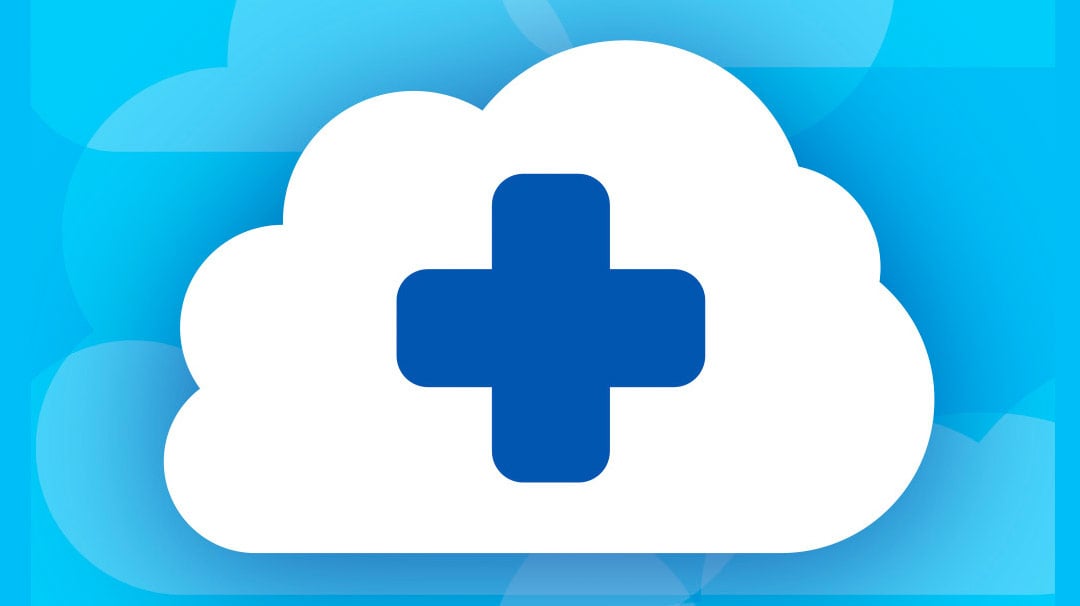Cloud Storage In Healthcare: 7 Benefits for Your Practice
by Rin Mosher on Sep 5, 2025 1:00:29 PM

HIPAA-compliant cloud storage may not be the first item on your list of priorities as a care provider, but it's something everyone needs when running a health-services business today. Need proof? Look no further than the facts.
In 2023, 133 million records were exposed or impermissibly disclosed to cybercriminals. Meanwhile, the average cost of a healthcare data breach now exceeds $10.9 million. This makes secure cloud storage not just a compliance requirement but critical to business protection.
Jump to the 7 Benefits of cloud storage in healthcare>>
Here’s how your practice can benefit from healthcare-compliant cloud storage and the best practices you should follow when trying to maximize its value to your organization:
What Is Cloud Storage In Healthcare?
Cloud storage in healthcare refers to online data storage that protects sensitive patient and medical data in the cloud while meeting strict privacy requirements.
Unlike traditional on-premise servers, this type of cloud storage maintains patient data, medical records, and sensitive health information in a more accessible way while adhering to strict industry-specific compliance standards.

The Nuances of Cloud Storage In Healthcare
It's important to understand that not all cloud storage is fit to serve your healthcare practice. Regular cloud providers may offer space to store important data but often at a much lower security standard.
In many cases, if you purchase cloud storage from one of these providers, you may be unknowingly exposing yourself to risks like data breaches, unauthorized access, and inadequate encryption.
Specialized healthcare solutions go beyond basic file storage, offering integrated features like automated backups, real-time synchronization across multiple devices, advanced encryption protocols, and detailed audit trails.
Above all else, healthcare cloud storage platforms are built to support medical workflows and foster collaborative care coordination between providers.
Why You Need Specialized Cloud Storage In Healthcare Operations
The implications of inadequate cloud storage in healthcare are wide-ranging. For starters, there's patient trust and safety to think about.
Doctors, healthcare organizations, and medical centers possess highly sensitive information. In the wrong hands, this information can compromise everything from someone's financial standing to their personal relationships, career prospects, and overall quality of life.
Beyond patient harm, severe legal and financial consequences come with insufficient data security. HIPAA violations range from $100 to $50,000 per infraction at an annual penalty limit of $1.5 million per category.
Data breaches also trigger mandatory notification requirements that damage an organization's reputation and result in lost patients and revenue.
"Data breaches also trigger mandatory notification requirements that damage an organization's reputation"
Efficiency is another consideration. Inadequate storage systems create workflow inefficiencies that negatively impact patient care quality.
When healthcare providers can't reliably access patient records, diagnostic images, or treatment histories, they may end up delaying critical decisions, order duplicate tests, or make treatment decisions based on incomplete information – all of which compromise patient outcomes and increase healthcare costs.
Top Use Cases for Cloud Storage in Healthcare
When you adopt cloud storage in healthcare, you’re actually investing in operational efficiency, patient protection, and regulatory compliance.
The following use cases provide just a few examples of how compliant cloud storage transforms healthcare delivery across the board.
Telehealth and Remote Patient Monitoring
The medical field continues to change after the pandemic, with the widespread normalization of digital-first services.
Telehealth is one example; telemedicine encounters increased by 766% in the first three months of the pandemic.
Years later, care providers and patients alike have come to consider remote appointments, online prescriptions, and electronic form completion and communication as standard.

In a survey of 423 leaders by the Medical Group Management Association, 35 percent said fine-tuning electronic health records systems was their top priority for the coming years. Doctors recognize the importance of bringing operations online; however, they need to do so in a way that keeps critical records safe.
Stress-Free Compliance with HIPAA, PIPEDA, GDPR
There are a lot of regulations to comply with today. These include:
HIPAA
(Health Insurance Portability and Accountability Act) - The foundational U.S. regulation requiring healthcare organizations to implement administrative, physical, and technical safeguards to protect patient health information.
PIPEDA
(Personal Information Protection and Electronic Documents Act) - Canada's federal privacy law governing how private sector organizations collect, use, and disclose personal information in commercial activities.
GDPR
(General Data Protection Regulation) - The European Union's comprehensive data protection regulation that applies to any organization processing EU residents' personal data, including health information.
HITECH Act
- This strengthens HIPAA's privacy and security protections and establishes breach notification requirements for healthcare data.
State-specific regulations - Certain regions maintain privacy laws that either supersede or complement those of their country. The California Consumer Privacy Act (CCPA) is one example.
No matter the case, specialized healthcare cloud storage systems like Sync.com are built with the above complex compliance requirements in mind. So, when you choose to adopt a cloud provider like Sync.com, compliance is built in by default.
Research and Data Sharing
Healthcare research depends on secure, efficient data sharing between institutions, research teams, and collaborative networks. Unfortunately, traditional methods of data sharing either create significant barriers to collaboration or introduce compliance risks.
Healthcare-compliant cloud storage solutions allow authorized researchers to access the data sets they need, share findings with peer institutions, and collaborate on multi-site studies without compromising patient privacy.
Advanced access controls also ensure that only qualified personnel can view specific data types, while audit trails track interactions for regulatory documentation.
Patient Record Management
Does your organization have more than one office? When you securely store patient records in the cloud, you eliminate data silos by synchronizing information across all facilities in real-time.
"Eliminate data silos by synchronizing information across all facilities in real-time."

With seamless integration between sites, coordinating care becomes a lot less complicated. Both doctors and their administrative staff can reduce instances of duplicate tests and use their resources more efficiently.
Medical Imaging (Radiology, Pathology)
Healthcare-compliant cloud storage solutions are specifically designed to handle high-resolution medical images efficiently. Their rapid upload and retrieval capabilities allow radiologists and pathologists to access images from any location while maintaining the image quality essential for accurate diagnosis.
Disaster Recovery
The healthcare sector isn't immune to digital disaster – if anything, it's at a greater risk of cyberattacks. Pair that with uncontrollable natural disasters, power outages, and system failures, and modern practices stand no chance of delivering consistent, quality care without proper backup systems in place.
Therein lies another beneficial use case for cloud storage in healthcare.
Today's healthcare compliant systems maintain multiple copies of critical data across geographically distributed data centers so localized incidents don't result in permanent data loss.
As a care provider, you’ll benefit from this insurance against disruptions, not to mention peace of mind, which can’t be bought.
7 Benefits of Using Cloud Storage at Your Healthcare Practice
From telehealth integration to disaster recovery, the use cases show just how versatile compliant cloud storage is in modern healthcare operations. These applications translate into real benefits that can transform how your practice operates.
Let's explore seven key advantages of adopting cloud storage in your healthcare practice:
1) Improved Data Accessibility and Security Across Teams
Real-time updates to patient records mean that when a nurse updates vital signs, a physician immediately sees those changes during their consultation. This seamless information flow improves continuity of care and reduces the risk of medical errors caused by outdated information.

Healthcare teams also benefit from faster retrieval of large files, including medical imaging, comprehensive lab results, and detailed patient histories. This eliminates the delays that plague physical records or disconnected systems.
Cloud storage acts as a centralized repository that allows authorized staff to access patient data from any location or device with internet connectivity.
Best of all, accessibility doesn't have to come at the expense of security with a reputable service provider. Robust access controls ensure only authorized users can view sensitive data based on their role and clearance level.
Did you know?
Sync Pro Teams+ Unlimited plans allow you to create custom roles that fit your organizational structure. Create department-specific roles, or get as granular as individual user roles. Rest assured that all of your roles are governed by a super admin account, so you can ensure the right person is always in control.
2) Easier Collaboration Between Healthcare Providers
Cloud storage facilitates secure file sharing between different specialists, general practitioners, and support staff, which is particularly valuable for cross-location care coordination in hospital networks, referral centers, and specialist consultations. Multiple healthcare providers can access patient records simultaneously for true multidisciplinary team care.
By reducing document duplication and ensuring all team members work from the same accurate, up-to-date information, healthcare providers can focus on delivering quality care rather than worrying about data integrity and version control.
3) Reduced Infrastructure Costs, Maintenance, and Security Concerns
Cloud storage replaces the substantial upfront investments required for on-site servers and expensive storage hardware with predictable monthly or annual service fees.

Your practice can also enjoy potential cost savings on physical space, cooling systems, and energy consumption required for in-house servers. Adopting cloud storage in healthcare can give you professional-level security systems without the corresponding investment in specialized IT personnel and equipment.
4) Seamless Scalability and Flexibility
Healthcare data volume grows continuously, and cloud storage can easily accommodate it.
The benefits of scalability work in both directions: expand without having to purchase and install new hardware when demand increases, and easily scale down if you ever need to, without worrying about sunk costs from depreciating hardware investments.
Cloud storage also supports the rapid adoption of new healthcare technologies that require substantial storage capacity, from advanced diagnostic imaging systems to AI-powered analysis tools.
Adaptability proves especially valuable in a sector with ever-changing regulations, file formats, and evolving service delivery models.
5) Unlimited Storage Capabilities
One of the most significant administrative advantages of cloud storage is the elimination of capacity management. There’s no need to constantly monitor storage limits, migrate older records to different systems, or delete historical data to free up space.
Getting unlimited cloud storage capacity allows you to meet legal and regulatory mandates for keeping patient records - for extended periods of time - without requiring additional hardware investments or complex archival systems.
The best cloud storage solutions can easily accommodate this with a wide range of medical imaging files, from CT scans to MRIs to high-resolution pathology images.
6) Streamlined Disaster Recovery Using Cloud Storage In Healthcare
As we touched on in the use cases above, the healthcare sector faces significant risks from cyberattacks, natural disasters, and system failures, making robust disaster recovery essential for patient care continuity.
With compliant cloud storage automatically syncing to secure off-site data centers, critical patient information remains accessible even when local systems fail.
"Critical patient information remains accessible even when local systems fail."

Cloud storage also empowers the rapid restoration of patient data should it become compromised in some way. Whether due to an in-office system failure or cyberattack, this capability dramatically reduces downtime for critical healthcare operations.
7) Better Support for Modern Remote Care and Telemedicine
Cloud storage has become invaluable to healthcare’s shift toward digital-first models. It’s already providing the foundation for effective telemedicine programs around the world.
Thanks to solutions like cloud storage, healthcare teams can now support patients in underserved areas. These providers not only benefit from real-time access to existing patient data, but they can also collect ID, test results, and more, directly through their secure client file portal.
Did you know?
Sync.com’s client file portals aren’t only secure, they’re also completely customizable to your organization’s brand logo and colors, so patients get a unified care experience.
Bonus Benefits to Look for When Adopting Cloud Storage In Healthcare
Not all cloud storage in healthcare is made equal. Just like with any other software product, you'll want to be selective about the vendor you work with.
Look for providers that prioritize:
- HIPAA compliance and security features built into the platform's core architecture
- End-to-End Encryption, authentication, and access controls
- Business Associate Agreements (BAAs)
that clearly define their legal responsibilities for protecting patient health information
Best Practices for Implementing Cloud Storage in Healthcare
Successfully transitioning to cloud storage requires careful planning and execution. Keep the process efficient and compliant by following these steps:
Conduct Comprehensive Risk Assessments Before Migration
Before migrating any patient data to the cloud, conduct a thorough risk assessment evaluating your current data security posture, identifying potential vulnerabilities, and establishing clear security requirements for a cloud storage solution.

The assessment should include an inventory of all data types, classification of sensitivity levels, and documentation of current access controls and user permissions. It should also include a detailed migration timeline that prioritizes the most critical data systems while minimizing disruption to patient care.
Implement Comprehensive Staff Training on Secure File Handling
Your cloud storage solution is only as secure as the people using it are diligent. That’s why it’s worth putting extra effort into training.
Effective programs cover secure file handling procedures, proper access protocols, and incident reporting requirements . They also hammer home the importance of strong password policies, multi-factor authentication, and the risks associated with unauthorized data sharing.
Don’t forget to communicate who your staff should contact for day-to-day questions, and urgent requests.
Regular refresher training and updates on new security protocols can help further maintain awareness and compliance as systems evolve and new threats emerge over time.
Develop a Clear File Architecture and Organization Plan
Your file architecture should allow you to easily retrieve patient files and important data while maintaining compliance with retention requirements and audit trails.
Consider using top-level folders to organize files based on project, department, or themes. Then use sub-folders (folders within each top-level folder) to store files that are relevant to one aspect of the top-level folder.
For example, if a top-level folder is Radiology, sub-folders may include X-rays, CT scans, MRI, and Ultrasound. Click here for some additional file architecture examples.
Partner with Providers Offering White-Glove Onboarding Support
Setting up cloud storage in healthcare environments should be a collaborative experience. Choose a cloud storage provider that offers comprehensive onboarding support, including dedicated demos, detailed question-and-answer sessions, and ongoing customer success support.
Sync.com understands that healthcare organizations have unique needs – that's why we provide specialized support throughout the implementation process.
Here's what that looks like:
- A dedicated customer success manager
- Assistance with initial setup
- Staff training coordination
- Ongoing optimization recommendations
Need help getting started?
Contact us.
Contact us.
Sync supports healthcare providers of all sizes, from hospitals to small private offices. Get specialized cloud storage solutions designed to support the healthcare industry.
Conclusion: Moving Forward with Cloud Storage In Healthcare
The benefits of cloud storage extend far beyond simple file management. From improved data accessibility and enhanced collaboration to streamlined disaster recovery and seamless telehealth integration.
When you adopt the right cloud storage solution, you gain operational advantages with significant cost savings, unlimited scalability, and robust security features. It’s a must-have for any medical provider in the twenty-first century.
Frequently Asked Questions About Cloud Storage in Healthcare
No, consumer cloud storage services like Google Drive, Dropbox Personal, or iCloud are generally not appropriate for healthcare data. These platforms often lack the security controls, encryption standards, and compliance certifications required for HIPAA compliance.
They typically don't offer Business Associate Agreements and often cannot provide the audit trails, access controls, and breach notification procedures required for healthcare data protection. Healthcare organizations must use specialized cloud storage solutions designed to store medical data.
Yes, absolutely. HIPAA regulations apply to all healthcare providers regardless of practice size, and sole practitioners are just as liable for data breaches and compliance violations as large hospital systems.
In fact, smaller practices are often more vulnerable to cyberattacks because they typically have fewer IT resources and security protocols in place. Industry-compliant cloud storage provides sole practitioners with enterprise-level security without requiring significant IT investment or specialized technical knowledge.
Cloud storage in healthcare typically costs more than consumer-centric solutions but significantly less than maintaining on-premise servers. Most providers offer tiered pricing based on storage volume and user count. These costs should be weighed against the expenses of maintaining physical servers, IT staff, security systems, and potential compliance violation penalties.
Reputable cloud storage providers maintain multiple backup copies of your data across geographically distributed data centers, providing automatic redundancy and disaster recovery capabilities.
However, healthcare organizations should also maintain their own backup strategies, including regular data exports and retention of critical files in multiple locations. Work with your cloud storage provider to understand their backup procedures, recovery timeframes, and data retention policies to ensure they align with your organization's needs and regulatory requirements.
With Sync.com, you can keep your cloud-stored files automatically synced across multiple devices to provide better, real-time client care. Store files off-device using Cloud Files or by moving files into your Sync Vault long-term storage for infrequent use and access.
- September 2025 (3)
- August 2025 (1)
- July 2025 (3)
- June 2025 (1)
- May 2025 (1)
- April 2025 (1)
- February 2025 (2)
- January 2025 (1)
- December 2024 (1)
- November 2024 (2)
- October 2024 (5)
- September 2024 (6)
- August 2024 (3)
- July 2024 (6)
- June 2024 (4)
- May 2024 (4)
- April 2024 (7)
- March 2024 (4)
- February 2024 (5)
- January 2024 (5)
- December 2023 (1)
- November 2023 (3)
- October 2023 (3)
- September 2023 (2)
- August 2023 (5)
- July 2023 (2)
- June 2023 (4)
- May 2023 (2)
- March 2023 (2)
- February 2023 (1)
- January 2023 (3)
- December 2022 (1)
- November 2022 (3)
- October 2022 (2)
- August 2022 (3)
- July 2022 (1)
- June 2022 (1)
- May 2022 (2)
- April 2022 (1)
- March 2022 (2)
- January 2022 (4)
- December 2021 (2)
- October 2021 (3)
- September 2021 (3)
- August 2021 (1)
- July 2021 (5)
- June 2021 (4)
- May 2021 (3)
- April 2021 (4)
- March 2021 (5)
- February 2021 (2)
- January 2021 (5)
- December 2020 (1)
- November 2020 (2)
- September 2020 (1)
- August 2020 (1)
- July 2020 (1)
- May 2020 (1)
- April 2020 (1)
- March 2020 (3)
- February 2020 (1)
- November 2019 (1)
- October 2019 (1)
- August 2019 (1)
- May 2019 (1)
- April 2019 (1)
- February 2019 (1)
- January 2019 (2)
- December 2018 (1)
- October 2018 (2)
- September 2018 (4)
- June 2018 (1)
- May 2018 (1)
- March 2018 (1)
- January 2018 (2)
- December 2017 (2)
- November 2017 (2)
- September 2017 (1)
- August 2017 (2)
- May 2017 (2)
- April 2017 (1)
- January 2017 (2)
- July 2016 (3)
- June 2016 (3)
- February 2016 (1)
- November 2015 (1)
- September 2015 (1)
- August 2015 (4)
- May 2015 (4)
- January 2015 (2)
- October 2014 (1)
- September 2014 (1)
- August 2014 (2)
- July 2014 (5)
- June 2014 (2)
- March 2014 (1)
- December 2013 (1)
- October 2013 (1)
- September 2013 (1)
- July 2013 (4)
- June 2013 (2)
- April 2013 (1)
- February 2013 (1)
- January 2013 (1)
Subscribe by email
You May Also Like
These Related Articles

Cloud Services for Law Firms: Moving, Managing and Maximizing Your Practice

Cloud Storage for Healthcare Providers: Everything you Need to Know
